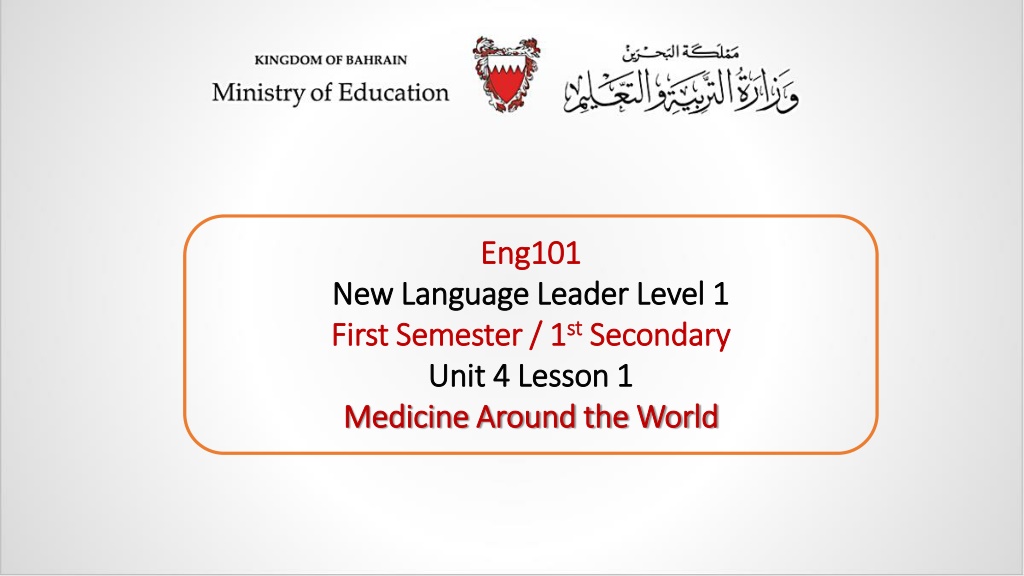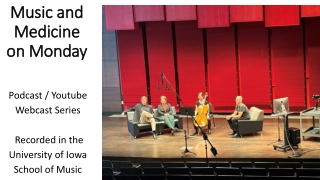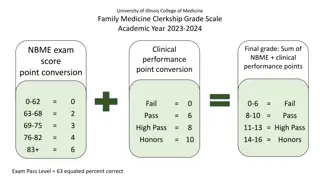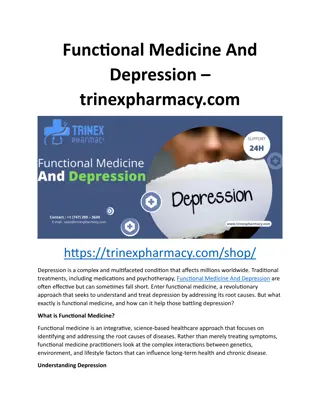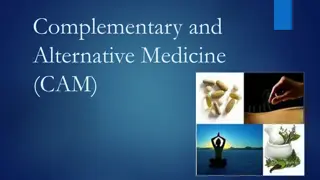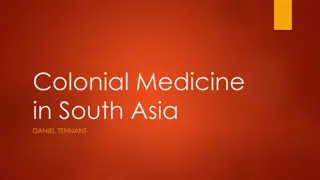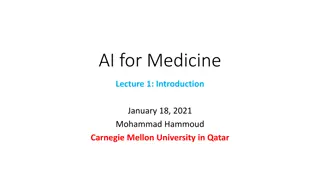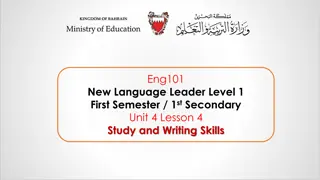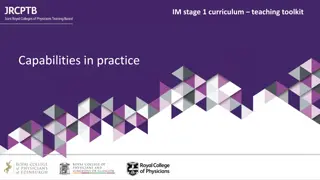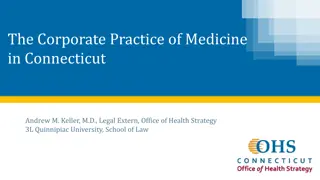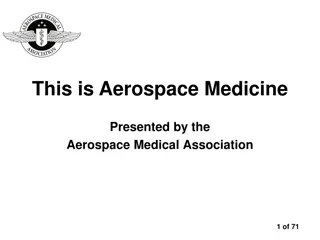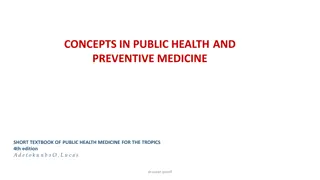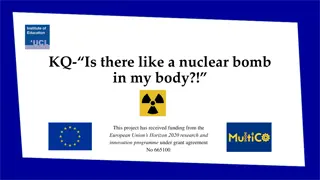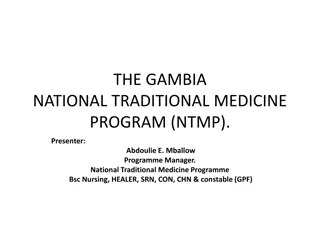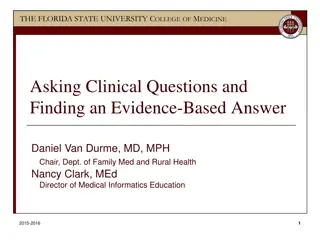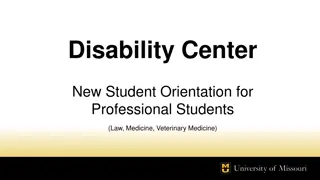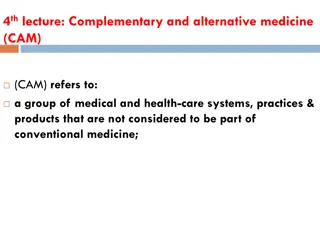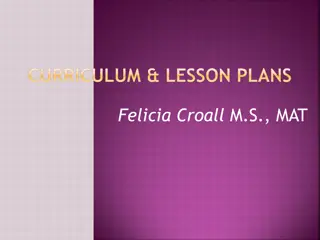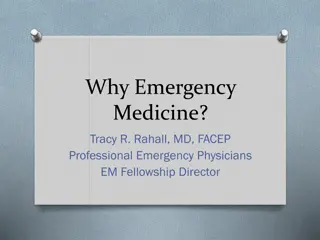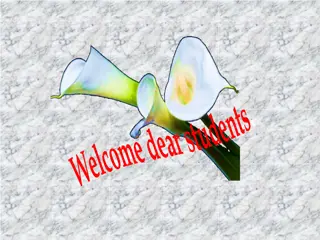Explore Medicine Around the World in Eng101 Lesson
Discover the medical landscape globally through Eng101's lesson on Medicine Around the World. The lesson covers vocabulary related to medicine, reading for gist and specific information, and learning about the present perfect tense. Dive into a short text about a medical training university in Bahrain and answer questions to test your understanding. Challenge yourself with questions on doctor's challenges, patient interactions, and medical developments.
Download Presentation

Please find below an Image/Link to download the presentation.
The content on the website is provided AS IS for your information and personal use only. It may not be sold, licensed, or shared on other websites without obtaining consent from the author. Download presentation by click this link. If you encounter any issues during the download, it is possible that the publisher has removed the file from their server.
E N D
Presentation Transcript
Eng101 Eng101 New Language Leader Level 1 New Language Leader Level 1 First Semester / 1 First Semester / 1st st Secondary Unit 4 Lesson 1 Unit 4 Lesson 1 Medicine Around the World Medicine Around the World Secondary
Eng101 unit 4 lesson 1 Medicine Around the World OBJECTIVE(S): OBJECTIVE(S): By the end of the lesson, students will have: By the end of the lesson, students will have: learnt vocabulary related to medicine. practised vocabulary related to medicine. read for gist and specific information. revised the present perfect in all forms and learnt more about the time expressions used with it.
Classify each word in the box under the right category in the table. (Use your dictionary if needed) Classify each word in the box under the right category in the table. (Use your dictionary if needed) medicine medicine optician optician mobile unit mobile unit paediatrician paediatrician clinic clinic nurse nurse dentist dentist operation operation vaccination vaccination ward ward hospital hospital doctor doctor Person Person Place Place Tool Tool Procedure Procedure mobile unit optician medicine operation clinic paediatrician vaccination ward nurse hospital dentist doctor Eng101 New Language Leader Level 1 4.1 Medicine Around the World
Read the following short text and answer questions that follow. Read the following short text and answer questions that follow. In 2004, a new medical training university was set up in Manama Bahrain, RCSI Bahrain or as known RCSI-MUB. It was set up in Manama by the Royal College of Surgeons in Ireland. In 2008, the university moved to its new university building next to the King Hamad University Hospital. The KHUH is the main teaching hospital for RSCI Bahrain. university offers students in both Bahrain and Ireland the chance to spend one semester in the other s country. RCSI-MUB is a leading international medical school, with over 40 different nationalities. The 1. Where is the university located? It is located in Manama, Bahrain. 2. When was it established? It was established in 2004. 3. According to you, give one advantage of the university s location being next to the King Hamad University Hospital? Possible answer: Possible answer: It is easy for the university students to get practical experience at the hospital. Eng101 New Language Leader Level 1 4.1 Medicine Around the World
Read the following questions and write them on your notebook before moving to the reading on the next slide. 1. State two challenges that doctors face today. a. ... b. .. 2. Mention three phases in the first paragraph that doctors should follow when dealing with patients. a. ..b. c. 3. Find one word in the second paragraph that means choices. 4. The word practicein paragraph 2 probably means a. exercise b. business c. process 5. What does the pronoun them in paragraph 3 refers to ? 6. What should doctors do to know about the recent medical developments. .. 7. Find a word in the last paragraph that means trying very hard to do something Eng101 New Language Leader Level 1 4.1 Medicine Around the World
Now, read the article below and answer the questions that you covered on the previous slide. A doctor is a person who maintains or restores human health through the practice of medicine. He or she faces the challenge of diagnosing and treating human illnesses, ailments, injuries, pain or other conditions. This is done by listening to the patient, understanding the problem, and then using his or her scientific expertise to know how to best treat the disease or health concern. There is a specific type of doctor for almost all of the major systems in the human body. There are many places of work for doctors. Some start working in an existing practice while others open their own practice. Large hospitals are always ready to hire new employees. It is believed that a lot of things depend on personal preferences, as the environment of each place is different. A doctor usually works very long hours and must be available in any emergency. These hours are spent seeing patients in an office, performing tests and interpreting them, prescribing medications or treatments, making hospital visits, taking notes on the physical condition of patients, counseling them on how to stay healthy and talking to them about additional treatments. They keep up to date by taking courses and regularly reading books and medical journals. Ultimately, the doctor strives to be a reliable person who tries to help others by being caring, knowledgeable, understanding, prepared, and ready to give the best of themselves. Although he/she isn t always able to save lives, but able to make them as good as possible. Eng101 New Language Leader Level 1 4.1 Medicine Around the World
Now, check your answers. 1. State three challenges that doctors face today. a. . b. .. .. diagnosing human illnesses treating illnesses, injuries etc. 2. Mention three phases in the first paragraph that doctors should follow when dealing with patients. listening to the patient understanding the problem treating the disease or health concern a. ..b. c. 3. Find one word in the second paragraph that means choices. preferences 4. The word practicein paragraph 2 probably means a. exercise b. business c. process 5. What does the pronoun them in paragraph 3 refers to ? tests .. 6. What should doctors do to know about the recent medical developments. .. 7. Find a word in the last paragraph that means trying very hard to do something strives They should take courses and regularly read books and medical journals. Eng101 New Language Leader Level 1 4.1 Medicine Around the World
GRAMMAR GRAMMAR Read the following sentences and underline the actions in each sentence. Read the following sentences and underline the actions in each sentence. 1 I ve just spent hours to prepare for the exam. 2 She started planning for her trip to Dublin in Spring. 3 So far, in my time as a student, I ve already participated in 50 operations. 4 Last year I took part in the Health Awareness Award. Note: Action verbs, also called dynamic verbs, express an action whether it be physical or mental. An action verb explains what the subject of the sentence is doing or has done. Here are some common examples of action verbs.: act, agree, arrive, build, call, climb, fall, fix, give, kick etc. Eng101 New Language Leader Level 1 4.1 Medicine Around the World
The Present Perfect The Present Perfect : uses uses The present perfect tense is common in English. It is used for many different functions. 1. Actions which started in the past and are still continuing The present perfect is often used for an action that started at some time in the past and is still continuing now. In this case, the words for (with a length or period of time) and since (with a specific starting time) are usually used with the present perfect. He has lived in Bahrain for five years. (He started living in Bahrain five years ago, and he's still living there now.) She has worked at the University since 1994. (She started working at the University in 1994, and she's working there now.) 2. Actions (single action or repeated actions) which happened at some unknown time in the past. We can use the present perfect to say that something happened (or didn't happen), but it's not important (or not known) when it happened. In this case, we often use the words already, (not) yet, ever or never along with the present perfect. These words usually go in front of the past participle. I'vealreadyseen that film. I don't want to see it again. (It doesn't matter when I saw it.) Have you everbeen to Dubai? (It doesn't matter when you went I just want to know whether you have been there or not.) They have eaten at that restaurant many times. (Repeated past actions; when they ate there isn't important) Eng101 New Language Leader Level 1 4.1 Medicine Around the World
3. Actions which happened in the past, but have an effect in the present In this case, the action happened at some time in the past, but the effect of the action is still important now. It's easiest to understand this use if we compare present perfect sentences with simple past sentences. Have a look at the table below for further explanation. sentence meaning Present Perfect I' I've ve lost lost my glasses. my glasses. I don't have the glasses. They are still missing. I don't have the glasses. They are still missing. **Simple Past I I lost lost my glasses my glasses yesterday. yesterday. I didn't have them yesterday, but maybe today I I didn't have them yesterday, but maybe today I found them. found them. Present Perfect She She's 's broken broken her arm. her arm. The arm is still injured. The arm is still injured. **Simple Past She She broke broke her arm. her arm. The arm is probably OK now. The arm is probably OK now. Eng101 New Language Leader Level 1 4.1 Medicine Around the World
How do we form the Present Perfect? Can you formulate the rule? Well, we form the Present Perfect with have and the past participle * regular verbs: infinitive + -ed; irregular verbs: 3rd column of the table of the irregular verbs) has 3rd person singular (he, she, it) have all other forms 2. Affirmative sentences in the Present Perfect: 2. Affirmative sentences in the Present Perfect: irregular verbs irregular verbs I/ You/ We/They have havegone He/She/ It have havegone gonehome. 1. Affirmative sentences in the 1. Affirmative sentences in thePresent Perfect regular verbs regular verbs I/ You/ We/They have haveopen He/She/ It has has open opened ed the door. Present Perfect: : gone home. opened ed the door. 4. Negative sentences in the 4. Negative sentences in thePresent Perfect irregular verbs irregular verbs I/ You/ We/They have havenot He/She/ It has has not notgone gonehome. Present Perfect: : 3. 3. Negative sentences in the Negative sentences in thePresent Perfect regular verbs regular verbs I/ You/ We/They have havenot He/She/It has has not not open opened Present Perfect: : not gone gonehome. not open opened edthe door. edthe door. 5. Questions in the 5. Questions in thePresent Perfect Have Have I / you/ we/they open Has Has he/she/ it open opened Present Perfect regular verbs opened edthe door? ed the door? regular verbs 6. Questions in the 6. Questions in thePresent Perfect Have Have I / you / we/they gone Has Has he/she/ it gone gone home? Present Perfect irregular verbs gone home? irregular verbs Eng101 New Language Leader Level 1 4.1 Medicine Around the World
Which of the following time expressions can you use with the present perfect? Which of the following time expressions can you use with the present perfect? five months ago five months ago last year yesterday in the last few days never yesterday ever this year at five o clock never this week on December 20th on December 20th so far to date at five o clock today today to date Check your answer. Check your answer. this year, today, Ever, in the last few days, never, this week, so far, to date Eng101 New Language Leader Level 1 4.1 Medicine Around the World
Put the verbs in brackets in the present perfect or past simple of the verbs in brackets. Put the verbs in brackets in the present perfect or past simple of the verbs in brackets. Practice Highlight the time expressions. Highlight the time expressions. 1 In the last few weeks alone, doctors ________________ almost 100 operations. (OPERATE have operated have operated OPERATE) 2 So far this year, doctors __________________ tests for almost 1000 homeless people worldwide. (COMPLETE) have completed have completed COMPLETE) became became 3 In 1951, the health and education of children in Australia ____________ a priority for Save the Children branches across the country. (BECOME BECOME) 4 This year, volunteers __________________ kids with type 1 diabetes to learn how to manage their diabetes in a safe and fun environment. (HELP HELP) haven t received haven t received have helped have helped 5 Residents in two villages in the desert __________________ any food supplies this week as the drought continues. (NOT RECEIVE NOT RECEIVE) Eng101 New Language Leader Level 1 4.1 Medicine Around the World
Make the present perfect - choose positive, negative or question: Further practice Further practice 1. (I / go / to the library today) _______________________________________________________________ 2. (you / keep a pet for three years) _______________________________________________________________ 3. (you / eat Thai food before?) _______________________________________________________________ 4. (it / rain all day?) _______________________________________________________________ 5. (who / we / forget to invite?) _______________________________________________________________ 6. (he / not / forget his books) _______________________________________________________________ 7. (she / eat all the chocolate!) _______________________________________________________________ 8. (I / explain it well?) _______________________________________________________________ 9. (who / he / meet recently?) _______________________________________________________________ 10. (I / know him for three months) ______________________________________________________________ Eng101 New Language Leader Level 1 4.1 Medicine Around the World
Check your answers. Check your answers. 1. (I / go / to the library today) 6. (he / not / forget his books) _________________________________ He hasn t forgotten his books. _________________________________ I have been to the library today. 2. (you / keep a pet for three years) 7. (she / eat all the chocolate!) _________________________________ You have kept a pet for three years. _________________________________ She has eaten all the chocolate! 3. (you / eat Thai food before?) Have you eaten Thai food before? 8. (I / explain it well?) _________________________________ Have I explained it well? _________________________________ 4. (it / rain all day?) 9. (who / he / meet recently?) _________________________________ Who has he met recently? _________________________________ Has it rained all day? 5. (who / we / forget to invite?) 10. (I / know him for three months) _________________________________ I have known him for three months. _________________________________ Who have we forgotten to invite? Eng101 New Language Leader Level 1 4.1 Medicine Around the World
This is the end of the presentation. This is the end of the presentation. Thank you for paying attention. Thank you for paying attention. Eng101 New Language Leader Level 1 4.1 Medicine Around the World
